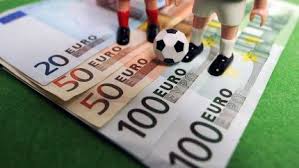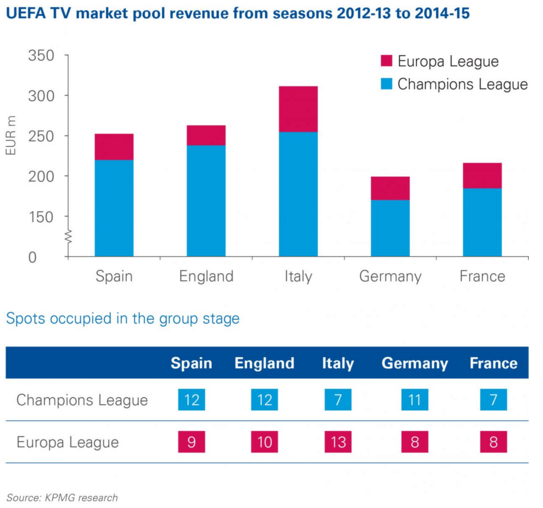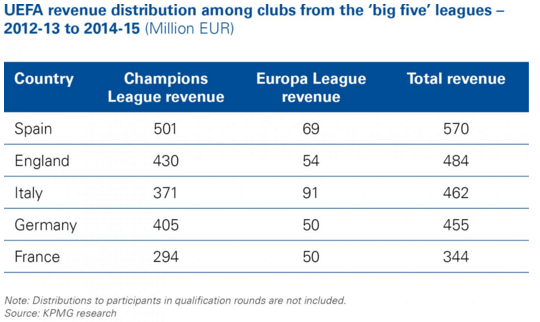By Paul Nicholson
May 4 – On the day that FIFA president Gianni Infantino addressed his former UEFA colleagues in Budapest with a plea for them to forgo their $5 million grants from FIFA for the greater good of developing world football, KPMG’s Football Benchmark team (also based in Budapest) produced an analysis of how UEFA has distributed its substantial wealth from its two major competitions (Champions League and Europa League) over the past three seasons.
UEFA’s revenues for its two senior men’s club competitions is impressive, and how it is divvied up to clubs is the result of a hard negotiated contract with the clubs that Infantino was a key party to achieving when he was UEFA’s general secretary.
In the 2014-15 season the Champions League generated just under €1 billion for the participating clubs and almost €240 million for clubs in the Europa League. Revenues are distributed via a fixed participation fee, performance related payouts, and market pool (the value of the national TV market of each club).
It is where this revenue is distributed that suggests that Infantino’s plea is going to fall on a lot of deaf European ears.
Benchmark’s report states: “Unsurprisingly, clubs from the ‘big five’ countries account for the majority of the revenue distributed by UEFA, some 71%. However, revenue distribution was more equitable in the Europa League. The share received by clubs from the ‘big five’ was just 48%. During the analysed period, 30 of 54 UEFA affiliated associations were not represented in the group and knockout stages of the Champions League, while only 11 associations had representation in each of the three seasons. By contrast, 34 associations were represented at least once in the Europa League and as many as half of them took part in the competition in all three editions.”
Essentially the big boys in the big markets are taking all the cash – well, their clubs are. UEFA has already forgone a more egalitarian principal of solidarity, caring and sharing equitably with all its member federations in a deal that Infantino was instrumental in putting in place.
A plea to help with cash for development promises doubtless made at FIFA by the former European wheeler dealer, seems unlikely to be taken too seriously outside the big five European markets of England, France, Germany, Italy and Spain who might feel an emotional tug towards helping him out for old times sake – after all he did dosh them and their clubs up.
Benchmark takes a deeper look at how the numbers break down and their findings illustrate how the mechanism for revenue distribution favours the big five leagues and countries:
- Spanish clubs are the biggest winners (on and off the pitch) with €570 million in the three seasons 2012-13 to 2014-15.
- Italian clubs have the third highest payout with €462 million. On Champions League revenues alone, Italy is placed below Germany. However Italian clubs benefited significantly from Europa League revenue distribution, earning €91 million – 32% more than the total earned Spanish clubs, despite Sevilla FC being champions in both 2014 and 2015.
- Italian clubs occupied the highest number of participation spots in the Europa League (13), more than any other country, and also commanded the highest Europa League TV market pool distributed among clubs (€56.8 million).
- Italian teams are closely followed by German clubs (€455 million). While Germany was well represented at European level with a total of 11 Champions League and 8 Europa League competitors in the last three seasons, its clubs received the lowest TV market pool revenues among the ‘big five’ countries (€199 million).
- French clubs earned the least of the ‘big five’, but received higher revenues than German clubs from the market pool (€216 million) but their position was impacted by considerably lower participation fees and performance bonuses. French clubs occupied just 15 spots across the Champions League and the Europa League with Paris Saint-Germain FC the only French club reaching the latter stages of the UCL in each of the three seasons under review.
The Europa League does provide clubs from smaller countries a platform to participate in European football with added incentive of qualification for the following season’s big money Champions League for the winners (though it is almost always a Big 5 league team that wins the Europa League).
So with the UEFA’s wealth carefully concentrated into the hands of the big nations, such ragged trousered philanthropy as proposed by Infantino looks highly unlikely from all of Europe’s 55 member nations.
In the book (The Ragged Trousered Philanthropist) the “philanthropists” Robert Tressel writes about in 1910 are the workers who, in his view, acquiesce in their own exploitation in the interests of their bosses. In the UEFA case it appears the new FIFA boss is working on a similar principal with the ‘lesser’ nations in his plea for European member associations grant money.
As a self-proclaimed ‘numbers man’ it seems hard to believe that even he believes his plea will get the 54 times $5 million he appears to be requesting – a cool $270 million over four years. Even to Europe’s supposedly bloated federations (remember the bulk of the UEFA money is going to clubs) it is not an insignificant amount of money.
Contact the writer of this story at moc.l1714135804labto1714135804ofdlr1714135804owedi1714135804sni@n1714135804osloh1714135804cin.l1714135804uap1714135804



